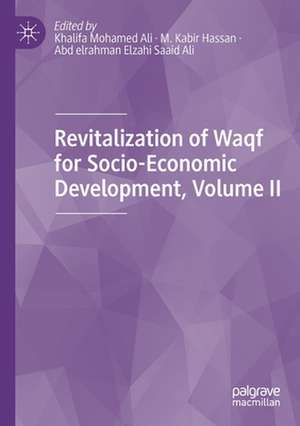Revitalization of Waqf for Socio-Economic Development, Volume II
Editat de Khalifa Mohamed Ali, M. Kabir Hassan, Abd elrahman Elzahi Saaid Alien Limba Engleză Paperback – 14 aug 2020
This book provides a comprehensive analysis of Waqf management and its impact on socio-economic development, specifically financial inclusion and sustainable development as well as of the legal issues in Waqf management in IsDB member countries and jurisdictions. It explores various aspects of Waqf management in IsDB member countries/jurisdictions as well as in non-Muslim majority countries such as Waqf regulation, its modernization, and relationship to Maqasid Al-Shari’ah; performance of Waqf activities; time and activity-wise distribution of Waqf resource management; the antecedents and consequences of Waqf assets (both physical and cash); the strategies and models to promote Waqf related activities for greater socio-economic development; good governance practices through the formulation of informed policies for Waqf projects, among others. Comprising different issues and perspectives adopted by various researchers, the work is specifically designed to meet the needs of academics and industry practitioners in the field of Islamic finance.
| Toate formatele și edițiile | Preț | Express |
|---|---|---|
| Paperback (1) | 1109.62 lei 6-8 săpt. | |
| Springer International Publishing – 14 aug 2020 | 1109.62 lei 6-8 săpt. | |
| Hardback (1) | 1113.39 lei 6-8 săpt. | |
| Springer International Publishing – 25 iul 2019 | 1113.39 lei 6-8 săpt. |
Preț: 1109.62 lei
Preț vechi: 1353.19 lei
-18% Nou
Puncte Express: 1664
Preț estimativ în valută:
212.39€ • 230.78$ • 178.53£
212.39€ • 230.78$ • 178.53£
Carte tipărită la comandă
Livrare economică 21 aprilie-05 mai
Preluare comenzi: 021 569.72.76
Specificații
ISBN-13: 9783030184513
ISBN-10: 303018451X
Pagini: 323
Ilustrații: XXXI, 323 p. 34 illus., 21 illus. in color.
Dimensiuni: 148 x 210 mm
Greutate: 0.47 kg
Ediția:1st ed. 2019
Editura: Springer International Publishing
Colecția Palgrave Macmillan
Locul publicării:Cham, Switzerland
ISBN-10: 303018451X
Pagini: 323
Ilustrații: XXXI, 323 p. 34 illus., 21 illus. in color.
Dimensiuni: 148 x 210 mm
Greutate: 0.47 kg
Ediția:1st ed. 2019
Editura: Springer International Publishing
Colecția Palgrave Macmillan
Locul publicării:Cham, Switzerland
Cuprins
1. Introduction.- 2. Role of Waqf to attain the ‘SDG-1: Ending Poverty’ in Bangladesh.- 3. Financing the Sustainable Development Goals (SDGs): The Socio-economic role of Awqaf (Endowments) in Bangladesh.- 4. Integrating Family Waqf into an Inheritable Going Concern Business: An Instrument for Sustainable Welfare of Exempted Heirs.- 5. Exploring Dynamics of Private Giving as Income Support Institution for Endowment Deficient Consumers.- 6. Analysis of The law of Waqf in Thailand.- 7. Waqf Law and Islamic Religious Revenue: New Sources of a State Revenue.- 8. Legal Constraints to the Development of Waqf.- 9. Management of Mudaraba Waqf Cash Deposit in Islami Bank Bangladesh Limited: An Evaluation.- 10. Cash Waqf and Preferred Method of Payment: Case of Malaysia Using an AHP Approach.- 11. The Indonesia Waqf Board (Bwi): An Analytical Network Process Analysis.- 12. Waqf Management in the Light of Maqasid Al-Shar‘Ah: Bangladseh Perspective.- 13. Decomposing Problems in Cash Waqf Fundraising in Indonesia.- 14. Do Religiosity and Socio-Economic Aspects Influence Zakat and Waqf Payment? (Case Study of Ultra Micro SMEs in Indonesia Baitul Maal Wa Tamwil).- 15. Mediating Role of Trust in Cash Waqf Donations.
Notă biografică
Khalifa Mohamed Ali holds MA and PhD in Economics from Iowa State University, USA, where he taught Economics. He worked as assistant and associate professor of Economics at the United Arab Emirates University, UAE, and is currently a senior economist at the Islamic Research and Training Institute (IRTI), Islamic Development Bank (IsDB).
M. Kabir Hassan is a Professor of Finance in the Department of Economics and Finance at the University of New Orleans, USA, where he currently holds two endowed Chairs—Hibernia Professor of Economics and Finance and Bank One Professor in Business. He was the University of Louisiana System’s outstanding faculty member for 2019. Dr. Hassan is the winner of the 2016 Islamic Development Bank (IsDB) Prize in Islamic Banking and Finance.
Abd elrahman Elzahi Saaid Ali is a Senior Economist at the Islamic Research and Training Institute (IRTI), Islamic Development Bank (IsDB).
M. Kabir Hassan is a Professor of Finance in the Department of Economics and Finance at the University of New Orleans, USA, where he currently holds two endowed Chairs—Hibernia Professor of Economics and Finance and Bank One Professor in Business. He was the University of Louisiana System’s outstanding faculty member for 2019. Dr. Hassan is the winner of the 2016 Islamic Development Bank (IsDB) Prize in Islamic Banking and Finance.
Abd elrahman Elzahi Saaid Ali is a Senior Economist at the Islamic Research and Training Institute (IRTI), Islamic Development Bank (IsDB).
Textul de pe ultima copertă
This book provides a comprehensive analysis of Waqf Management and its impact on socio-economic development, specifically financial inclusion and sustainable development as well as of the legal issues in Waqf management in IDB member countries and jurisdictions. It explores various aspects of Waqf management in IDB member countries/jurisdictions as well as in non-Muslim majority countries such as Waqf regulation, its modernization, and relationship to Maqasid Al-Shari’ah; performance of Waqf activities; time and activity-wise distribution of Waqf resource management; the antecedents and consequences of Waqf assets (both physical and cash); the strategies and models to promote Waqf related activities for greater socio-economic development; good governance practices through the formulation of informed policies for Waqf projects, among others. Comprising different issues and perspectives adopted by various researchers, the work is specifically designed to meet the needs of academics and industry practitioners in the field of Islamic finance.
Caracteristici
Brings together in one collection research discussing major issues in Islamic finance that has an impact on socio-economic development, sustainability, and financial inclusion Provides a deep understanding of Waqf and various tools and techniques used in Waqf management and the distribution of income in Waqf Adopts new approaches in addressing issues related to Waqf management and discussions and analyzes controversial issues in light of Islamic Shari’ah
